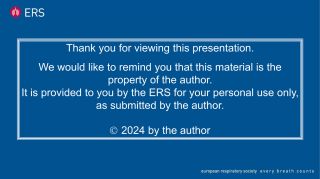19 November, 2024 | Online
18:00-19:00 CET
Chairs: Prof. Sophia E. Schiza (Heraklion, Greece), Dr Esther Irene Schwarz (Zürich, Switzerland)
Speakers: Dr Manuel Sanchez De La Torre (Toledo, Spain), Prof. Dr Dries Testelmans (Leuven, Belgium)
Fees: Free for ERS members / €10 for non-members
Find out more about becoming a member
In the absence of an ERS Congress 2024 Year in review session focused on sleep disordered breathing, ERS Assembly 4 would like to use the opportunity to communicate and summarise the latest evidence relevant for clinical practice (group 4.02) and from translational research (group 4.01). It will be important to provide a summary of the latest papers in the field of sleep-disordered breathing via the ERS Respiratory Channel.
Year in review provides an overview to all participating members of the best scientific contributions in the field of sleep disordered breathing for the year 2024, being a summary of extraordinary value to highlight the latest advances in this field.
Subtitles will be available for this webinar. Test our new AI-based live translation feature and give us your feedback.
Educational aims
- Participants will gain insight into the most significant translational findings in the field of sleep-related breathing disorders.
- Recognise the latest pertinent contributions to understanding the pathophysiological basis of sleep-breathing disorders.
- Identify the primary needs in the field of sleep-disordered breathing that could drive the initiation of new scientific trials and studies in the upcoming years (research agenda).
- Understand the latest evidence that will influence clinical practice and help guide treatment decisions in patients with sleep-disordered breathing.
Topics
- Sleep disordered breathing
- Obstructive sleep apnoea
- Central sleep apnoea and Cheyne Stoke's respiration
- Translational, clinical and basic research
- Randomised controlled trials
- Personalised medicine
Target audience:
- Clinicians
- Students
- Trainees
- Researchers
- Allied Health Professionals
Format
- This webinar follows a journal club format and it will last for 1 hour.
Learning outcomes
After following this webinar, participants should be able to:
- Identify hot topics in the sleep-related breathing disorders
- Propose new action together with research activities and clinical studies to advance knowledge on sleep disordered breathing
- Update their training in sleep-related breathing disorders with the most relevant contributions and discoveries made in the last year
CME credit
An application for accreditation of this webinar has been made to the European Board for Accreditation in Pneumology (EBAP) for 1 CME credit per 1-hour attendance. If accredited, the CME credit will be granted upon attendance of at least 60 minutes during the live webinar only.
What is a webinar?
A webinar closely simulates a lecture-based teaching experience. The speaker can interact with the audience, just as in a classroom setting. During the webinar, you will be asked to share your opinion on issues related to the topic using interactive polls.
All participants will be able to hear the lecturer and see the slides throughout the presentation. As a participant you will be able to pose questions or discuss ideas with the other participants via the text chat facility and the speaker will respond to the questions via the microphone.
Login guidelines
More information will be communicated in due course.
- Please log in to the webinar 20 minutes before it is scheduled to commence. If you have any technical difficulties whilst trying to log in or during the session please contact e-learning@ersnet.org.
- Check Central European Time.
- To achieve the best quality, we recommend to avoid downloading anything from the internet during your connection to the lecture and stopping all other programmes.
- Please also ensure that your audio settings are not set to mute and adjust the volume to a comfortable level.

